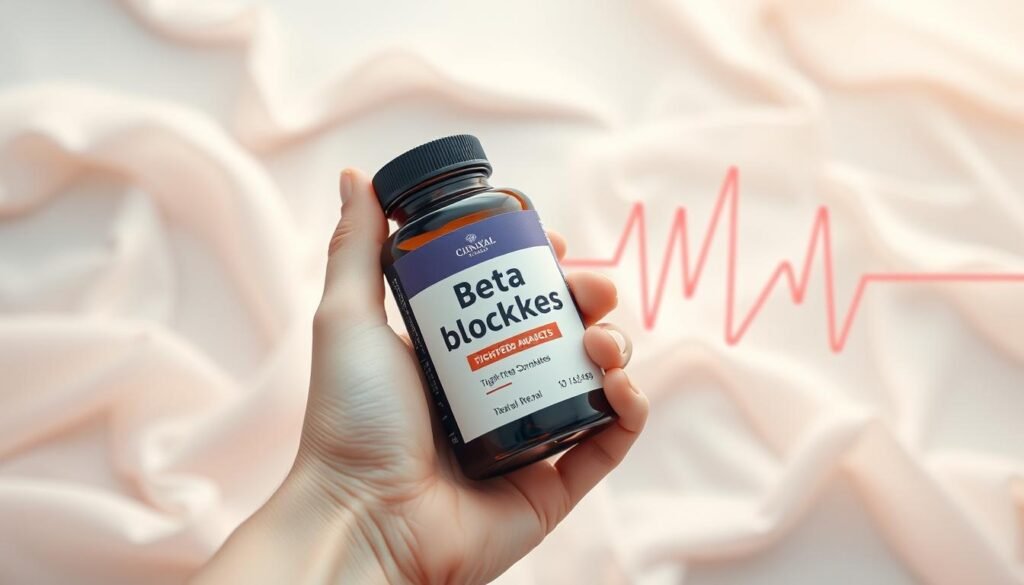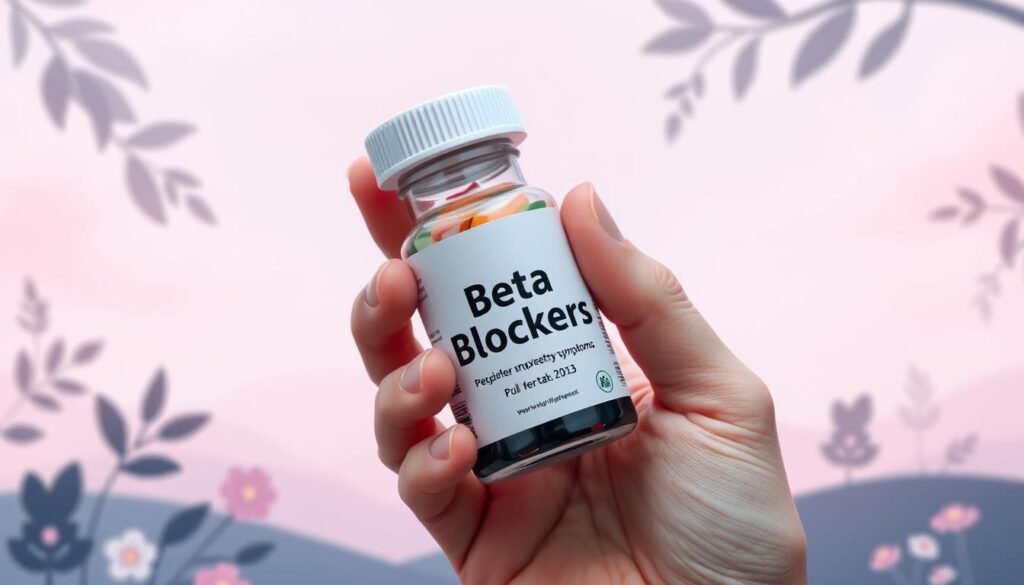A 2016 research review found that propranolol, a widely-used beta-blocker, can manage anxiety disorders almost as well as benzodiazepines. These medications are known for heart issues but are also good at easing anxiety’s physical signs. They are especially helpful for brief, event-triggered anxiety, like speaking in public or during performances.
This article looks into how beta blockers ease physical anxiety symptoms like fast heartbeats, shaking, and sweating. We’ll cover how they work, their types, and possible side effects. You’ll discover how beta blockers can be part of managing anxiety’s physical problems. Keep reading to learn more about how they provide relief and could help in a treatment plan.
Key Takeaways
- Beta-blockers can reduce physical anxiety symptoms, including heart palpitations and tremors.
- The effects of propranolol are similar to those of benzodiazepines for short-term anxiety treatment.
- These medications work best for anxiety related to specific events rather than for long-term anxiety disorders.
- Common side effects include fatigue, dizziness, and changes in sleep, but serious side effects should be reported to a doctor.
- Beta-blockers may interact with other medications, so it’s essential to inform healthcare providers about all medications being taken.
What Are Beta Blockers?
Beta blockers are medicines with many uses beyond just heart issues. People find them helpful for several health problems. This shows how useful they are in medicine.
Definition and Common Uses
Beta blockers are mainly for high blood pressure. But they also help with heart problems, prevent migraines, and more. About 30 million adults in the U.S. use them. Some people find them helpful for anxiety, especially during stressful times like public speaking.
How They Work in the Body
Beta blockers slow down your heart by blocking adrenaline receptors. They ease symptoms of anxiety such as fast heart rate and shaking. The help they provide in beta blockers for anxiety treatment comes from calming the body’s reaction to stress. This makes facing nerve-racking situations easier for some.
How Beta Blockers Help with Physical Symptoms of Anxiety
Beta blockers play a key role in handling anxiety’s physical signs. They focus on the body’s stress reaction. This helps ease symptoms like heart palpitations and sweating.
Impact on the Fight-or-Flight Response
Beta blockers are crucial in softening the fight-or-flight response. They lower adrenaline’s effects, aiding in calmness during tense moments. Beta blockers and panic attack symptoms show a significant benefit. They can steady the heart rate and improve bodily reactions. This is especially important for those who experience performance anxiety or stressful situations.
Relief from Physical Reactions to Anxiety
For those with anxiety, beta blockers can reduce physical symptoms. Symptoms like heart palpitations, shaking, and dizziness can be lessened. This allows people to concentrate better on their tasks, without being sidetracked by their body’s reactions.
Studies indicate that beta blockers offer a safe solution. They are effective for beta blockers and anxiety heart palpitations, with fewer side effects than other treatments.
| Physical Anxiety Symptoms | Effect of Beta Blockers |
|---|---|
| Heart Palpitations | Regulates heart rate |
| Trembling | Reduces physical tremors |
| Sweating | Minimizes excessive sweating |
| Dizziness | Stabilizes bodily reactions |
Types of Beta Blockers Prescribed for Anxiety
It’s important to know about the different beta blockers. They help a lot with anxiety, especially the physical parts. Each kind works best for certain situations. Here, we talk about the common ones and how they’re different. This helps in choosing the right one for anxiety.
Common Beta Blockers Used
Propranolol and atenolol are often picked for treating anxiety. They’re not mainly meant for anxiety, but doctors give them for that reason. Propranolol is good for stopping things like fast heartbeats and shaking. This is useful when you’re really nervous or in stressful times.
Differences Between Beta Blockers
Beta blockers are not all the same. They have different features, like selectivity and half-life. Some target certain parts of the body, which might mean fewer side effects. Others affect more areas and can have more side effects. Knowing these differences helps pick the best one for managing anxiety.
| Beta Blocker | Type | Half-Life | Common Uses |
|---|---|---|---|
| Propranolol | Nonselective | 3-6 hours | Performance anxiety, stage fright |
| Atenolol | Selective | 6-9 hours | General anxiety management |
| Metoprolol | Selective | 3-7 hours | Management of anxiety symptoms |
| Nadolol | Nonselective | 20-24 hours | Long-term anxiety control |
Looking into more studies and conversations from experts can give you a better view. You can find out a lot about how beta blockers help with anxiety. For example, check out this article for more information.
Off-Label Use of Beta Blockers for Anxiety
Beta blockers are well-known for helping with heart issues. But doctors now also use them for anxiety. They offer a good choice for those who haven’t found help from usual treatments.
What Does “Off-Label” Mean?
“Off-label” means doctors use drugs for non-approved reasons. Beta blockers, beyond treating high blood pressure and migraines, are used for beta blockers anxiety relief. They help with anxiety in many cases, providing a new way to feel better.
Why Doctors Prescribe Beta Blockers Off-Label
Sometimes, common anxiety drugs don’t work or are risky. That’s when doctors may choose beta blockers. They’re good at easing anxiety’s physical effects like rapid heartbeat and sweating. Drugs like Propranolol and Atenolol are popular choices, helpful for different kinds of anxiety.

Situational Anxiety and Beta Blockers
Beta blockers are popular for handling situational anxiety. Especially in cases that trigger social anxiety symptoms. These meds help people perform better under stress by reducing anxiety’s physical effects.
Performance Anxiety Relief
Performance anxiety hits many during public talks, exams, or sports. Symptoms like shaking, sweating, and fast heartbeat can be intense. Taking beta blockers eases these signs.
This improves performance and boosts confidence. The increase in beta blocker prescriptions shows they help many overcome their anxiety.
Examples of Situational Anxiety
Situational anxiety appears in various situations, like:
- Public speaking engagements
- Job interviews
- Air travel
- Performing in front of an audience
During such times, many face social anxiety symptoms that impact their performance. Beta blockers help manage these signs. They bring calmness and improve the experience.
The growing preference for beta blockers shows their importance in anxiety management. It’s key for those looking to ease their social anxiety symptoms.
Who is a Candidate for Beta Blockers?
Beta blockers for anxiety hinge on understanding each person’s unique needs. They are best for those facing situational anxiety. Think public speakers or performers who need control over their racing hearts and trembling hands. It aims to help them keep cool under spotlight conditions.
Ideal Patients for Treatment
Those who face anxiety momentarily find beta blockers useful. They’re a fit for folks anxious during talks or sports. Ideal for those okay generally but flustered by specific events.
Considerations Before Starting Beta Blockers
Consulting a health professional before beginning beta blockers is a must. Asthma or low blood pressure can make their use risky. Open discussions ensure the safety and effectiveness of the treatment for each person. To dive deeper, click here.
| Condition | Considerations |
|---|---|
| Asthma | May worsen symptoms; consult doctor |
| Low Blood Pressure | Risk of further lowering blood pressure |
| Type 2 Diabetes | Monitor blood sugar levels closely |
| Heart Rate Issues | May need regular monitoring |
Side Effects of Beta Blockers
Many people take beta blockers without issues, but it’s vital to know potential side effects. Knowing about these effects helps you talk with doctors and make better choices for your health.
Common Side Effects to Expect
Beta blockers are usually okay for most, but they can cause side effects. Some side effects people often notice include:
- Fatigue
- Cold extremities
- Headaches
- Lightheadedness
If you’re just starting on beta blockers, keep an eye on these effects. Tell your doctor about any big changes.
When to Contact Your Doctor
Getting a doctor’s advice for serious side effects is key. You should look out for signs like:
- A very slow heart rate
- Shortness of breath
- Significant mood changes
Tell your doctor if your anxiety gets worse or doesn’t improve. Beta blockers might not be the best choice for you. For more on beta blockers and their effects, check this helpful article.
| Side Effect | Description | Action |
|---|---|---|
| Fatigue | A prolonged sense of tiredness and lack of energy | Consult a doctor if it interferes with daily activities |
| Cold Extremities | Low blood flow causing cold hands and feet | Notify a healthcare provider if persistent |
| Headaches | A common, yet often mild, side effect | Seek advice if frequent or severe |
| Lightheadedness | Dizziness that may occur when standing quickly | Discuss with a doctor if it occurs regularly |
Alternatives to Beta Blockers for Anxiety Management
More than 19% of people in the U.S. struggle with anxiety. This includes a lot of young people. Beta blockers help with the physical side of anxiety. But there are other ways to manage it.
Other Medications for Anxiety Relief
There are many medications that can help with anxiety. It depends on what each person needs. Some of these alternatives include:
- Benzodiazepines like alprazolam (Xanax) and lorazepam (Ativan) are great for intense anxiety moments.
- Selective serotonin reuptake inhibitors (SSRIs), such as escitalopram and sertraline, are good for long-term anxiety.
- Buspirone works well for both short-term and ongoing anxiety issues.
- Antihistamines like hydroxyzine help with anxiety without stimulants.
Non-Medical Approaches to Managing Anxiety
There are non-drug methods that can really help with anxiety too. These include:
- Cognitive-behavioral therapy (CBT), a strong treatment for anxiety.
- Mindfulness-based cognitive therapy (MBCT), proven effective in over 200 studies.
- Regular exercise, which lowers anxiety through activity.
- Mindfulness and relaxation techniques, which bring calm and resilience.

Using both medical and non-medical ways can help fight anxiety. This approach helps with both the mind and body.
How to Take Beta Blockers for Anxiety
Taking beta blockers the right way is key for anyone looking to ease anxiety symptoms. Medications like propranolol help with anxiety by calming physical signs of stress. It’s important to get the dose and timing right to stay safe and get the best results.
Dosing and Administration Guidelines
Beta blockers come in different strengths and forms. Doctors decide the best dose for each person based on their health and the kind of anxiety they have. Usually, you’ll start with a small dose of propranolol, like 10mg.
You might take it a few times a day, especially before things that stress you out. The most you might take is 160mg, depending on your situation. Always follow your doctor’s advice about how much to take. Don’t change your dose on your own.
What to Expect from Treatment
Most people start to feel calmer about 20 to 30 minutes after taking a beta blocker. You’ll likely notice your heartbeat slows down and you sweat less. This calm feeling can last for a few hours after each dose.
Using propranolol now and then is usually safe over the long term. And it’s different from some anxiety meds because you won’t get hooked on it. But it’s still a good idea to check in with your doctor regularly. This helps make sure you’re still using it the best way.
Risks and Precautions When Taking Beta Blockers
When you think about taking beta blockers for anxiety, knowing the risks is key. Some people should not use them because of health dangers. It’s also vital to know about drug interactions. This helps use the medication safely and control anxiety well.
Who Should Avoid Beta Blockers?
Some should stay away from beta blockers. Those with asthma, severe heart failure, or very low blood pressure face risks. Also, people on certain antidepressants need to talk to their doctor. Knowing the details about Propranolol is important for full understanding.
Drug Interactions and Warnings
Beta blockers may not mix well with other drugs. This is true for heart meds or some antidepressants. Everyone must tell their doctor about all drugs and vitamins they use. This avoids bad reactions. Talking openly with your doctor is crucial. This discussion is especially important for beta blocker use in treating anxiety. Knowing about interactions helps in choosing the right treatment. For extra info, visit beta blockers and understanding anxiety treatment.

Conclusion
Beta blockers are a big help for people who get really nervous, like when they have to speak in public. These meds calm down things like a fast heartbeat, shaking, and sweating. This lets people feel in control of their nerves. Musicians often use propranolol to fight off stage fright, showing how useful beta blockers can be.
Beta blockers are good for easing stress signs, but they’re just one piece of the puzzle. If you’re thinking about them, it’s key to talk with your doctor. Together, you can figure out the best plan. Knowing how these meds work helps you make smart choices for your mental health.